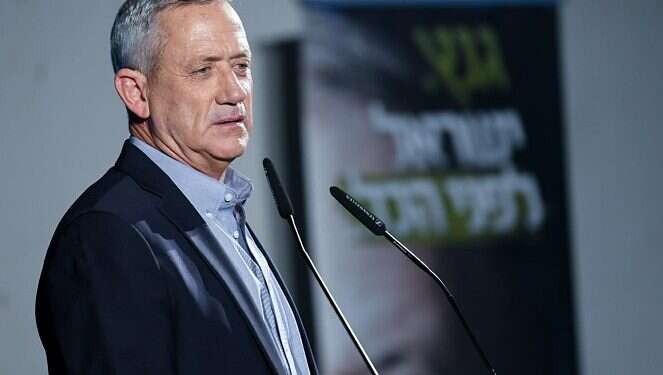The new campaign by the Israel Resilience Party, in which party leader Benny Gantz attacks Prime Minister Benjamin Netanyahu from the right, is a dizzying attempt to confuse the enemy. The reasoning behind the campaign is sound enough. For a decade, Netanyahu has been attacked from the left – he has been accused of isolating Israel diplomatically, hopelessness, and attacking democracy. These claims united an entire camp behind Tzipi Livni in 2009 and later Livni and former Labor party leader Isaac Herzog in 2015, but it was a small camp. Too small to regain power.
Gantz's advisers are calculating that the Left and the anti-Bibi camp are already on their side. But to move votes from one camp to another, they need to present Gantz as a viable alternative when it comes to right-wing issues, as well. He killed a lot of Arabs, and now he is promising not to make unilateral withdrawals (or at least his advisers made a commitment not to, as he has yet to speak on the issue), and also promised to bolster the large settlement blocs. In their campaign video, Netanyahu supported the 2005 disengagement from the Gaza Strip, buckled under to terrorism, and is paying Hamas $15 million a month.
Most of Gantz's people are leftists. Although most of them are political professionals, they find it hard to get into the mind of people on the Right. That is where Netanyahu is at an advantage. He knows it better than anyone, and he knows what buttons to press and when.
Recently, MK Ahmad Tibi (Ta'al) has had a starring role in the Likud campaign, and it's no coincidence. Messages about another disengagement, construction in Judea and Samaria, two states for two people, and world peace can be obfuscated – Gantz does it and so does Netanyahu. So the only real criterion is the political question: What government will be established after the election? The answer to that question reveals the true intention of the candidate. Netanyahu is promising a right-wing government, like the most recent one. But the only way Gantz can beat Netanyahu is by bringing the left-wing parties and the Arab parties together. He has no other option. None of the right-wing or haredi parties would join him in his effort to bring down Netanyahu. Like it or not, Gantz has become the leader of a center-left bloc.
Old politics
Apparently, it's very important to the public to see the Right in power in the next government.
The latest Israel Hayom-i24NEWS poll, conducted this week (after the Labor party primaries) asked respondents what government they wanted to see after the election. The results are surprising and explain the Likud campaign linking Gantz to Tibi and the Left.
According to the poll, 47% of respondents said they wanted the election to result in a right-wing government. Only 27% said they wanted a unity government, co-led by Netanyahu and Gantz. Another 26% said they wanted a left-wing government.
The Israel Resilience campaign is different, but still following Netanyahu's agenda. Gantz finds himself pushed onto the prime minister's home turf, and Netanyahu is deciding the rules. Like he commanded the IDF and later his collapsing company, Gantz is again hesitating, wondering and philosophizing, rather than leading or initiating.
The Israel Hayom-i24NEWS poll showed Gantz losing ground. Last week, he lost one projected seat. This week, he dropped another, falling from 20 to 19. In contrast, Yesh Atid leader Yair Lapid held steady at 12 seats, and Labor even gained.
Speaking of Labor, this week seemed to be the one the creaky old party was waiting for. Young MKs Itsik Shmuli and Stav Shaffir were elected to the top places on the Labor list in Monday's primaries. Veteran legislators Shelly Yachimovich and Amir Peretz came right below them, and the results were seen in the polls.
Behind the scenes, Peretz seems to have positioned himself as head of the largest Labor faction and into an important place for the battle that will take place after Labor chairman Avi Gabbay is gone. One of the reasons Shmuli won the top spot was because of the massive support he has from Peretz. The same is true for Merav Michaeli, who is No. 5 on the Labor list.
Yachimovich's performance was due to political advisor Yaya Fink. But apparently to succeed, she had to drop MK Eitan Cabel, who had expected her full support after he backed her for head of the Histadrut Labor Federation. Her support was halfhearted at best.
After the primaries, Gabbay set out on a round of appearances and interviews in which he explained how wonderful the Labor list was. From the outside, that appears to be true. But inside the party, Gabbay has reason to be worried. He only backed a few candidates, and they all failed in the primaries. Henrika Zimmerman, Emilie Moatti, Leah Fadida, and Shadi Kablan were all voted into "unrealistic" spots on the list, meaning they are unlikely to serve in the next Knesset.
Labor's biggest fear is losing more ground. So the idea of forming a joint party with Meretz is still on the table for some of the party's senior leaders, including MKs who made it into the top spots. The party has until Feb. 21 to make a decision.
The poll also looked at a scenario in which parties merge. In the case of a right-wing merger comprising Habayit Hayehudi, National Union and Otzma Yehudit; a center merger between Yesh Atid and Israel Resilience; and a joint Labor-Meretz list on the Left, Gantz and Lapid would win the largest number of seats – 32. The Likud would win 28, and Labor-Meretz would win 12 seats. The smaller right-wing list would win 11 seats. While it would make no appreciable difference if the center-left parties (Yesh Atid an Israel Resilience) merged with the Left, a joint list comprising the religious Zionist parties and the far-right Otzma Yehudit would definitely change the map and give Netanyahu the premiership once again.
Tipping the scales
The 2019 election is quite similar to the 1992 election. Then, too, the Left, led by Yitzhak Rabin, tried to retake the government. Then, too, it wasn't political issues that were at the forefront – it was corruption. "Crooks, we're sick of you," was the dominant slogan, aimed at the Likud under Yitzhak Shamir.
And like today, the head of the Likud at the time warned the right-wing parties that if they didn't join forces, the Left could topple the nationalist government. The Right didn't unite. The Moledet and Tehiya parties ran separately. Moledet did well but Tehiya, led by Geula Cohen, didn't make it past the minimum electoral threshold, thereby losing the Right two seats that could have tipped the scales. When the votes were counted, Shamir had only 59 seats. Rabin had managed to line up 61 seats, with the Arab parties, and was given a mandate by the president to form a government. No one remembers the corruption that was such a big issue in the election but the Oslo Accords and the wave of terrorist attacks that followed are fresh in everyone's mind.
Current election polls are painting a picture of a very delicate balance of seats on the Right. One or two seats in any direction could change everything. Otzma Yehudit is believed to be worth at least two seats. If it runs alone, it won't make it into the Knesset but it will lose two precious seats for the Right.
The dilemma facing Habayit Hayehudi leader Rafi Peretz and National Union leader Bezalel Smotrich is whether running with Otzma Yehudit out of concern for the camp as a whole is worth the potential damage that could happen if moderate right-wing voters defect out of loathing for the positions of the more radical elements in the right-wing bloc.
Otzma Yehudit won't make it into the Knesset. Netanyahu doesn't want them there and they don't want him. But if they do get in, it would prevent the rise of a left-wing government. Clearly, they won't join Gantz if he tries to form an opposition bloc with the Arab parties. But Eli Yishai's Yachad is also worth two seats if he too were to join the smaller right-wing bloc. He presents no concerns about extremism and lost votes so there is little to no opposition to his joining.
The only problem would be where to put him on the list. Right now, Peretz and Smotrich think there is no reason to place him higher than No. 5. For Yishai, that's an insult. He can't run on his own but he could bring a right-wing bloc a nice "dowry" of two seats.
Tibi, not so nationalist
Bit by bit, Tibi is worming his way into legitimacy in the eyes of the Jewish public. He used to be considered one of the more extremist MKs. He has never hidden his Arab nationalism or his loathing of the Zionist state. But he realized that the way to many Arab hearts – and plenty of Jewish hearts, too – was to dial down his nationalism and blatant identification with his brothers beyond the Green Line and build up positions about civil rights for the Arab population.
For now, he's succeeding. The poll gave Ta'al – which has split from the Joint Arab Party – five seats. Other polls project even more. Some polls predict he will win more seats than the Joint Arab List itself.
When Gantz was asked if he saw the Arab parties as legitimate, he said that he did, apparently thinking about Tibi. It's still not clear whether Tibi sees himself as a possible partner in any government, but there is no doubt that he wouldn't outright reject the idea of joining a leftist government.
The Left is busy worrying that the Right has gone too far right, but has difficulty seeing their own drift toward extremism on the other end. It's not just top Labor officials saying there is no real difference between them and Meretz. It happened much earlier, when the Left gave the crappy little radical group Breaking the Silence legitimacy, and now it's happening as the Left finds itself seriously considering a partnership with Tibi.




